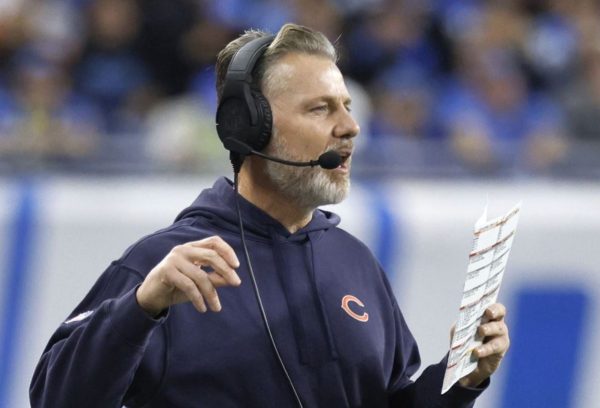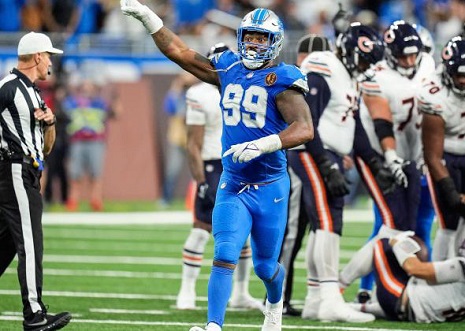Football 101: Do You Know When the Clock Starts & Stops?

It’s something that seems pretty simple, yet the average fan – and even the experienced NFL coach – has trouble understanding when the game clock runs and when it stops. Many fans of the game probably don’t understand the difference between the game clock and the play clock either. They are different and operate independently of each other.
For the most part, coaches, players, fans, sports bettors, even wives and girlfriends that suffer through the game we love know some of the basics about how the clock works in a football game. Now, there are some subtle differences between college football and the NFL when it comes to the clock. In most cases, the rules are the same, though that wasn’t always the case.
Here is your Sportsbook Advisor football clock management tutorial. Note: Someone has already passed this on to former Chicago Bears head coach Matt Eberflus.
Understanding When the Game Clock Stops
As mentioned, there are many similarities between the NFL and college football related to clock stoppages. Some of the more basic instances when the game clock stops include an incomplete pass, a penalty, a scoring play, and a change of possession. If you watch enough football, you probably are aware that any time the referee waves both hands back and forth over his head the game clock stops.
Pay attention as you watch your next NFL or college game. When a quarterback throws an incomplete pass, the referee will stop the game clock. The reason for the stoppage is so that the officials can spot the ball again for play. The clock will restart once the ball is snapped.
When there is a penalty, the referee will stop the clock while the officials discuss and administer the penalty. Once completed, the game clock may start right away or on the snap of the football. It would depend upon the result of the previous play. If the previous play was an incomplete pass, for example, the clock would remain stopped until the ball is snapped on the next play.
The clock stops after a touchdown, field goal, or safety. The clock also stops on any other change of possession. That would include after one team punts to its opponent, a team intercepts a pass, or a team recovers a fumble.
But Wait…There’s More
While many fans understand the basics of clock stoppage, many others forget that teams do get three timeouts per half. They can use them at any time, though consecutive timeouts are not permitted in college or the NFL. Officials may also call timeout for any number of reasons. The clock stops during those timeouts as well.
In today’s modern game, the clock will stop for play review. In college football, there is a replay official who handles all reviews. All scoring plays are automatically reviewed as well as other key plays. College coaches are allowed one challenge. In the NFL, coaches are allowed two challenges and can get a third if they win the first two. In all of those instances, the referee will stop the game clock while the play is reviewed.
In the NFL, the two-minute warning was something that was instituted in 1942. The game clock stops at (or close to) the 2:00 mark of each half. The clock restarts on the next snap of the ball. The two-minute warning did not exist in college football until this season. The “two-minute timeout” stops the clock near the end of each half, just as in the NFL.
Also of note in the NFL is the stoppage of the clock when a player goes out of bounds. A player must be moving forward when going out of bounds for the clock to be stopped after the play. If a player is moving backward when going out of bounds, the game clock continues to run. That’s because a player’s forward progress has been stopped and that occurred in the field of play.
In both the NFL and college, the game clock stops momentarily in the final two minutes of each half whenever a first down has been achieved. This is new to the college game. Prior to 2024, the clock stopped in for every first down.
Unless another factor stops the clock, the game clock is stopped after a first while the chains are moved and reset. The game clock will start on the referee’s hand signal. The clock also stops in the event of an injury.
The Game Clock vs. the Play Clock
NFL and college football games are 60 minutes long. They are divided into four quarters of 15 minutes each. The time in each quarter is kept on the game clock. The game clock counts down from 15:00 until it reaches 0:00 in each quarter. The game clock stops in all of the situations that were identified above.
The play clock runs separately and independently of the game clock. Now, the play clock is set to 40 seconds in some cases and 25 seconds in others. Distinguishing between the two is pretty easy. The NFL play clock is always set to 40 seconds except in the following situations:
- A team calls a timeout
- A change of possession
- The two-minute warning
- The end of a quarter
- After the enforcement of a penalty
- An extra point attempt
- A free kick
In the above cases, the play clock is set to 25 seconds. It makes sense if you think about it. Teams have already had time to regroup after the previous play. They don’t need any additional time. The 25-second play clock helps to speed up the game. Most clock rules were designed with speeding up the game in mind.
Clock Management in the NFL & CFB
 There are tons of stories of how coaches at every level of the game mismanage the clock in football. The biggest story of the 2024 NFL season related to clock mismanagement occurred on Thanksgiving Day in Detroit. The Lions, the current betting favorite to win Super Bowl LIX, had a nice lead over their NFC North rival Chicago Bears.
There are tons of stories of how coaches at every level of the game mismanage the clock in football. The biggest story of the 2024 NFL season related to clock mismanagement occurred on Thanksgiving Day in Detroit. The Lions, the current betting favorite to win Super Bowl LIX, had a nice lead over their NFC North rival Chicago Bears.
Detroit led 23-7 early in the fourth quarter. The Bears would get two touchdown passes from rookie QB Caleb Williams to move to within three points, 23-20. With 3:31 to play in the game, the Bears took over at their own one-yard line after a Lions punt.
The Bears had all three second-half timeouts left. They used the first on 3rd-and-7 from their own four-yard line. An official timeout was called for an injury and then the two-minute warning stopped the clock with Chicago at the 50-yard line after RB D’Andre Swift gained 12 yards and a first down.
Detroit used a timeout at the 1:08 mark thinking that if Chicago did score the Lions would need some time of their own to score as well. The Bears used a second timeout with :43 remaining and the ball at the Detroit 25-yard line. On the very next play, Williams completed a pass to Keenan Allen, who went out of bounds. Unfortunately, Chicago was called for a penalty.
On the next play from the Lions 35-yard line, Williams was sacked. The Bears, who still had a timeout remaining, chose not to use it. The clock continued to run and on 3rd-and-26 from the Detroit 41-yard line, Williams threw incomplete into the end zone. When the play ended, the game clock read 0:00.
The Bears could have “spiked” the ball at any point during that final drive to force a clock stoppage as the result of an incomplete pass. They also could have used their final timeout. Eberflus chose to use neither and now he is unemployed. He’s not the only NFL head coach who has mismanaged the clock, but for him, for fans, for bettors, and anyone with a love for the game, managing the game clock all starts with knowing when it starts and when it stops.

















